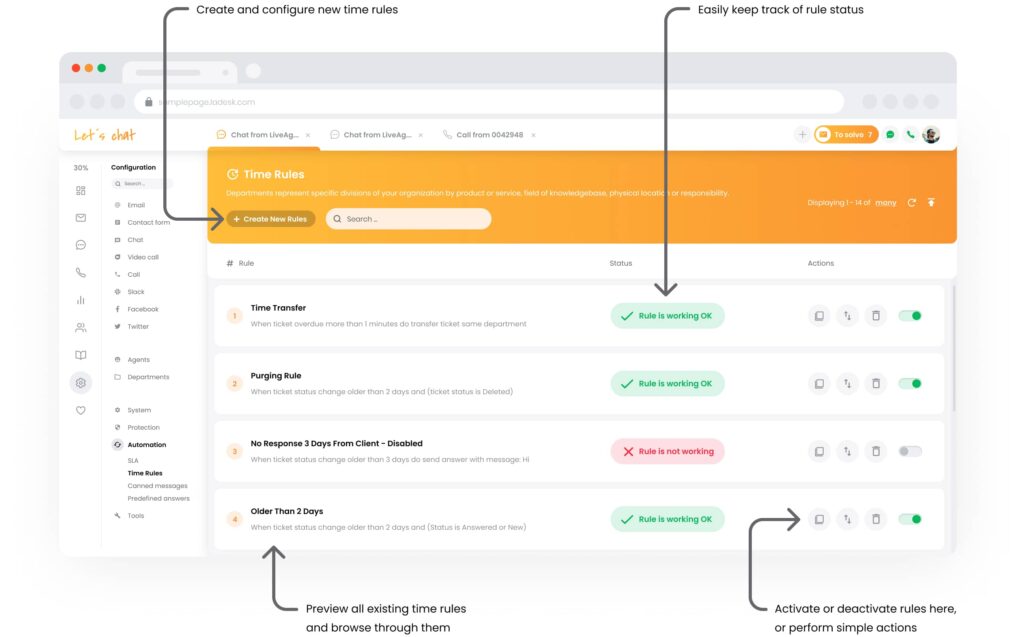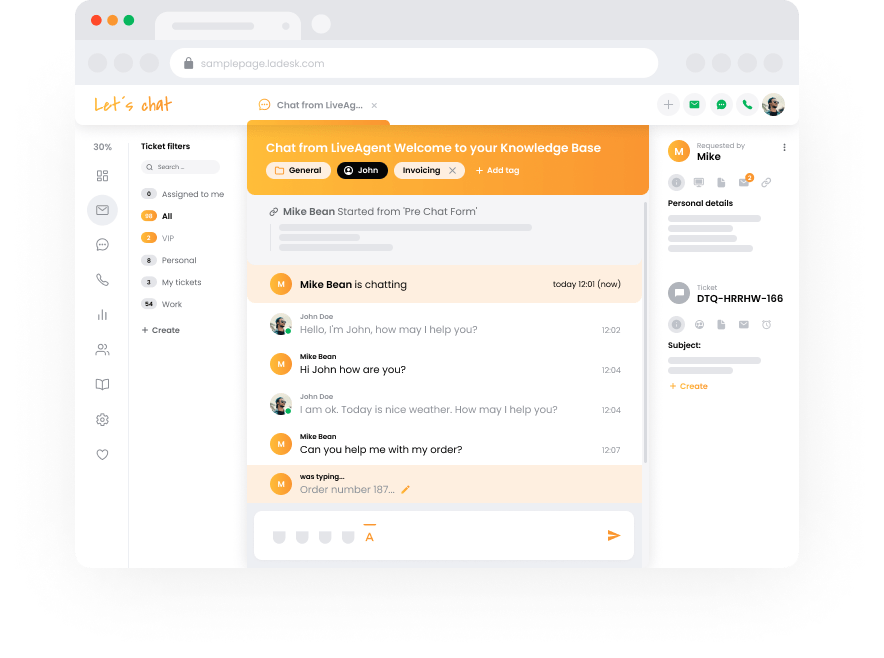Customer service consulting is a dynamic and open field that can get challenging to define. It shares skills and responsibilities with customer service representatives and managers yet remains unique. Learn about the key requirements, responsibilities, skills, and what sets customer service consultants apart.
Who is the customer service consultant?
Customer service consultants can take on various roles, depending on their focus area and the needs of their organization. Think of them as halfway between a customer service representative and a manager.
They will answer customer calls and deal with customers directly, as a representative would, but are more knowledgeable and apt to take on complex customer issues. They will take on managerial and administrative tasks, but focus on customer experience and improving processes, rather than overlooking the daily customer service department operations like a manager would.
There’s also the career path of an independent customer service consultant, serving as an external advisor to businesses. Companies may approach a consulting agency or hire a contractor on a single-project basis, for instance, to advise on automating processes or restructuring the department.
Types of customer service consultants
Strategic consultants will analyze and interpret large sets of customer data, create a strategy, provide businesses with a detailed plan, and oversee its implementation. They may often train the staff too. As an example, growing businesses may need them to help set new processes, such as selecting channels, setting SLAs, or determining the performance metrics to focus on.
Technology consultants specialize in lowering costs and improving efficiency by suggesting, implementing, and training the teams in the best software solutions. For example, forgetting to automate repetitive tasks causes businesses to bleed money. Additionally, it can overwork existing staff or necessitate unnecessary hiring.

Training consultants evaluate team members’ skills and develop education plans accordingly. Consistently strong customer service is becoming crucial, which is why helping entry-level staff with personal development and soft skills pays off.
Experience consultants specialize in tweaking the existing strategies to enhance every touchpoint of the customer journey, creating a path for consistently positive and memorable customer experiences.
Operations consultants specialize in improving customer service operations. They examine business infrastructure and resource allocation, and recommend changes accordingly. Businesses call on them after seeing a drop in efficiency, when they need help in pinpointing the problem. They can help tweak processes or go on to restructure entire departments.
Why is the role of a customer service consultant important?
Excellent customer service is increasingly becoming the best way for businesses to distinguish themselves from competitors. With a yearly average of 49% of customers leaving brands because of bad experiences, and the cost of acquiring new customers rapidly rising, only one thing is for certain — businesses can’t afford bad customer service anymore.
Whether in their customer-facing practice or while advising others, customer service consultants can be considered the architects of customer experience. Today, customers need to know that businesses care about them. That’s why the future of customer service is personalized. Limited staff can’t be fully attentive to a large customer base, but it surely can seem like they are.
Customer service consultants and managers can achieve this effect by using robust customer service software like LiveAgent to set clever strategies, allocate resources, and automate repetitive tasks.
What are the tasks of a customer service consultant?
As covered, a customer service consultant may be an internal customer-facing employee or an independent contractor advising the organization and their daily agenda will differ based on this.
The day of an internal consultant will start with catching up on new developments, and seeing if they have any open or unanswered tickets.

Throughout the day, they will partake in discussions and executive meetings with senior staff, but they’ll also set time apart to attend to and help junior colleagues with their concerns. On top of that, they may engage in any number of activities from the two categories below:
Customer-facing tasks
- Provide product and technical support to customers through the calls, email, and live chat
- Respond to customer inquiries, assess problems, and provide solutions
- Perform product training
- Maintain contact with customers to track issues, troubleshoot, and ensure customer satisfaction
- Develop and maintain a healthy relationship with customers
- Obtain and correctly record customer information.
- Gather feedback from customers and employees
Advisory and managerial tasks
- Analyze current practices, identify shortcomings, develop, discuss, and implement new strategies
- Monitor and evaluate the effectiveness of implemented strategies
- Analyze customer feedback and data to identify trends and areas for improvement
- Provide training and guidance to customer service representatives
- Track employee performance
- Identify, develop, and document policies and procedures to create and maintain effective information management systems
- Stay up to date with the latest trends in the customer service industry
- Manage, schedule, and work effectively with a team of customer service representatives
Independent consultants will still need to be backed by the skills and experiences associated with customer-facing tasks, but their daily agenda will consist only of advisory and managerial tasks, with additional tasks focused on their area of expertise.
Requirements and skills needed for customer service consulting
Like all jobs in customer service, a consulting position is still a people-first position. Recruiters will put natural communication skills as the utmost priority. Even when designing strategies for others, this position is ideal for great listeners and problem solvers who love people and love helping them even more. Here are the necessary soft skills:
- Great listener – Listening and understanding is the first step to solving a problem.
- Natural problem solver – Willingness and efficiency in resolving issues is a main skill for all customer service workers.
- Great communication skills – Whether facing customers or business clients, clear and effective communication is key.
- Patience and empathy – Clients do and will get frustrated. A patient and empathetic approach helps defuse these feelings.
Still, this senior role comes with certain experience, hard skills, and education requirements. Each consultant will bring a special set of skills and strengths to the table, but they are generally required to have:
- A bachelor’s degree in business administration or a similar field is a great advantage, though a high school diploma may suffice for some employers.
- Prior experience, usually 2+ years, in the same or a similar role.
- Knowledge of customer concerns, market trends, and industry best practices.
- Managerial and administrative skills, including the ability to oversee projects, manage teams, and handle administrative tasks effectively.
- Technology skills, including familiarity with customer service and customer relationship management software, as well as common computer skills and an affinity for innovation.
- An analytical and strategic mindset, as the role requires collecting and interpreting data to form the basis for future strategy and processes.
Conclusion
A customer service consultant job can be a dynamic mix of people-centric and data-driven approaches. A true people person with great analytic skills will genuinely thrive in this area.
After years of customer service experience, consultants develop a unique set of skills, being able to develop and materialize improvements, as well as manage and train other staff.
No matter the consultant’s focus area, strong customer service is impossible without comprehensive customer service software. To make both the managerial and customer-facing roles easier, try LiveAgent with the 30-day free trial.
Stand out with exceptional service!
LiveAgent provides all the tools your teams need to deliver exceptional service daily.
Frequently Asked Questions
How can you hire a customer service consultant?
Depending on your needs, you can hire an independent consultant to advise you on a project basis, approach a consulting agency, or post a job listing if you’re looking to include one in your team permanently.
What is the difference between a customer service consultant and a customer service agent?
The differences are seniority and the scope of responsibilities. A customer service consultant may and often will perform the duties of a customer service agent, but it doesn’t work the other way around. Agents usually are not required to analyze data sets, suggest improvements, or train other staff.
What jobs are similar to those of a customer service consultant?
Similar jobs to a customer service consultant include customer service managers and customer service representatives. Unlike managers, consultants are often customer-facing and handle complex issues, combining managerial and executive tasks. They may be hired as independent contractors to advise on staff training, operational improvements, customer experience enhancements, or new software implementations. These roles blend direct customer interaction with strategic responsibilities.
How can you become a customer service consultant?
This role requires prior experience in the customer service field, usually at least 2 years. Having a bachelor’s degree in a related field is a great advantage and may even be required by some employers. Even when dealing with strategy and planning, this is still a people-centric role and advanced communication skills are at the heart of it, closely followed by strategic and analytical thinking.
After learning about the role of a customer service consultant, you might be curious about the broader field of customer care. Discover the differences between customer care and customer service, and learn why customer care is crucial for enhancing your brand and building trust.
Provide excellent customer service
Discover unparalleled customer support with LiveAgent's all-in-one software. Benefit from 24/7 service, a free trial without a credit card, and seamless integration across 130+ ticketing features. Enhance your business with fast setup, AI assistance, live chat, and more. Choose LiveAgent for exceptional service and satisfied customers.
Inside an AI answer improver: How it works & how support teams can get the most out of it
Discover how LiveAgent’s AI Answer Improver boosts support by refining, extending, and simplifying replies for faster, clearer responses.
Elevating customer support quality with AI: tools, techniques & best practices
Elevate customer support with LiveAgent’s AI tools—deliver faster, clearer, and more consistent service. Try a 30-day free trial!

 Български
Български  Čeština
Čeština  Dansk
Dansk  Deutsch
Deutsch  Eesti
Eesti  Español
Español  Français
Français  Ελληνικα
Ελληνικα  Hrvatski
Hrvatski  Italiano
Italiano  Latviešu
Latviešu  Lietuviškai
Lietuviškai  Magyar
Magyar  Nederlands
Nederlands  Norsk bokmål
Norsk bokmål  Polski
Polski  Română
Română  Русский
Русский  Slovenčina
Slovenčina  Slovenščina
Slovenščina  简体中文
简体中文  Tagalog
Tagalog  Tiếng Việt
Tiếng Việt  العربية
العربية  Português
Português 




